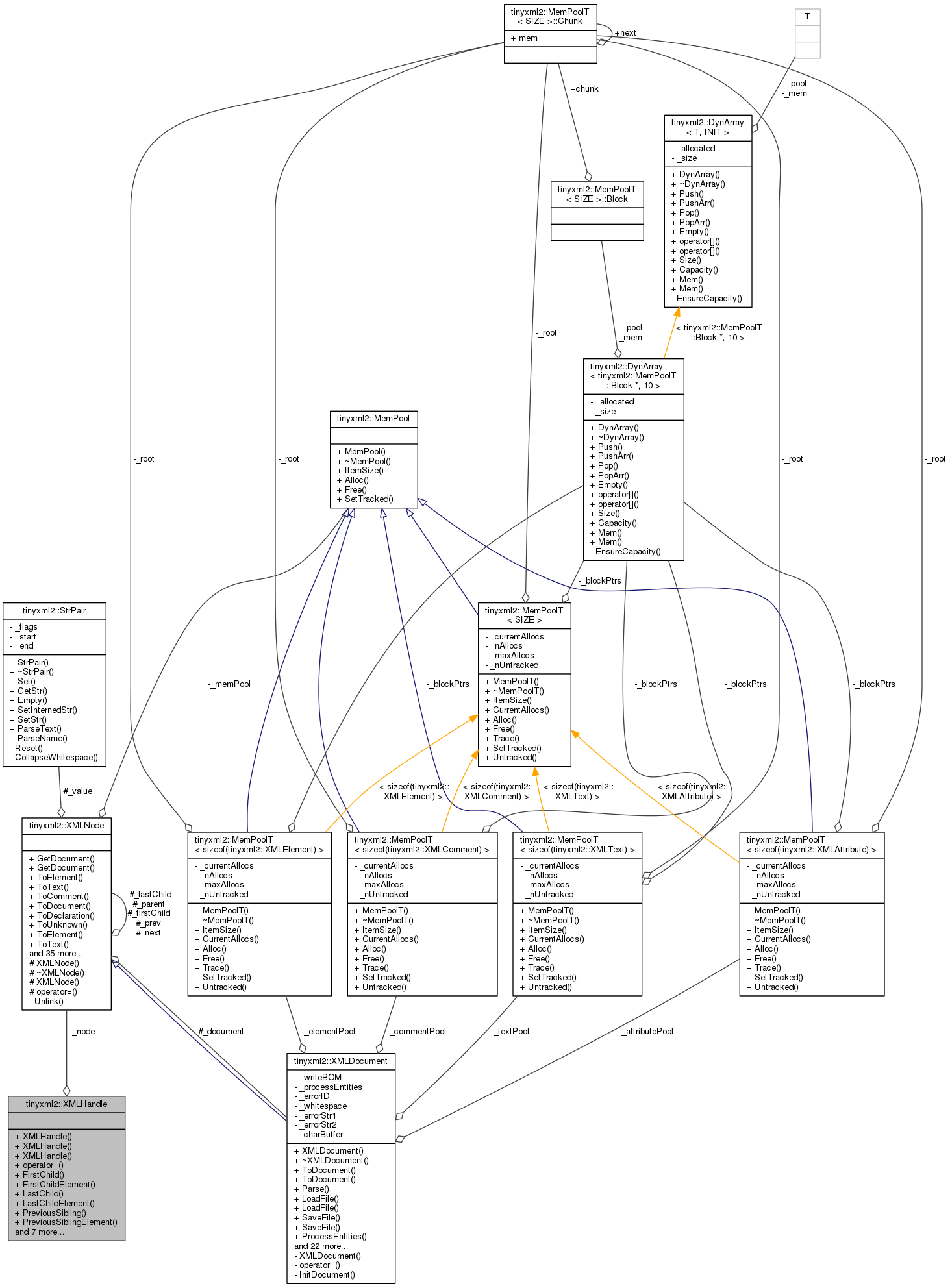|
Bike-X
0.8
|
|
Bike-X
0.8
|
#include "tinyxml2.h"

Public Member Functions | |
| XMLHandle (XMLNode *node) | |
| Create a handle from any node (at any depth of the tree.) This can be a null pointer. More... | |
| XMLHandle (XMLNode &node) | |
| Create a handle from a node. More... | |
| XMLHandle (const XMLHandle &ref) | |
| Copy constructor. More... | |
| XMLHandle & | operator= (const XMLHandle &ref) |
| Assignment. More... | |
| XMLHandle | FirstChild () |
| Get the first child of this handle. More... | |
| XMLHandle | FirstChildElement (const char *value=0) |
| Get the first child element of this handle. More... | |
| XMLHandle | LastChild () |
| Get the last child of this handle. More... | |
| XMLHandle | LastChildElement (const char *_value=0) |
| Get the last child element of this handle. More... | |
| XMLHandle | PreviousSibling () |
| Get the previous sibling of this handle. More... | |
| XMLHandle | PreviousSiblingElement (const char *_value=0) |
| Get the previous sibling element of this handle. More... | |
| XMLHandle | NextSibling () |
| Get the next sibling of this handle. More... | |
| XMLHandle | NextSiblingElement (const char *_value=0) |
| Get the next sibling element of this handle. More... | |
| XMLNode * | ToNode () |
| Safe cast to XMLNode. This can return null. More... | |
| XMLElement * | ToElement () |
| Safe cast to XMLElement. This can return null. More... | |
| XMLText * | ToText () |
| Safe cast to XMLText. This can return null. More... | |
| XMLUnknown * | ToUnknown () |
| Safe cast to XMLUnknown. This can return null. More... | |
| XMLDeclaration * | ToDeclaration () |
| Safe cast to XMLDeclaration. This can return null. More... | |
Private Attributes | |
| XMLNode * | _node |
A XMLHandle is a class that wraps a node pointer with null checks; this is an incredibly useful thing. Note that XMLHandle is not part of the TinyXML DOM structure. It is a separate utility class.
Take an example:
<Document>
<Element attributeA = "valueA">
<Child attributeB = "value1" />
<Child attributeB = "value2" />
</Element>
</Document>
Assuming you want the value of "attributeB" in the 2nd "Child" element, it's very easy to write a lot of code that looks like:
XMLElement* root = document.FirstChildElement( "Document" );
if ( root )
{
XMLElement* element = root->FirstChildElement( "Element" );
if ( element )
{
XMLElement* child = element->FirstChildElement( "Child" );
if ( child )
{
XMLElement* child2 = child->NextSiblingElement( "Child" );
if ( child2 )
{
// Finally do something useful.
And that doesn't even cover "else" cases. XMLHandle addresses the verbosity of such code. A XMLHandle checks for null pointers so it is perfectly safe and correct to use:
XMLHandle docHandle( &document );
XMLElement* child2 = docHandle.FirstChild( "Document" ).FirstChild( "Element" ).FirstChild().NextSibling().ToElement();
if ( child2 )
{
// do something useful
Which is MUCH more concise and useful.
It is also safe to copy handles - internally they are nothing more than node pointers.
XMLHandle handleCopy = handle;
See also XMLConstHandle, which is the same as XMLHandle, but operates on const objects.
Definition at line 1613 of file tinyxml2.h.
|
inline |
Create a handle from any node (at any depth of the tree.) This can be a null pointer.
Definition at line 1617 of file tinyxml2.h.
|
inline |
Create a handle from a node.
Definition at line 1621 of file tinyxml2.h.
|
inline |
Copy constructor.
Definition at line 1625 of file tinyxml2.h.
|
inline |
Get the first child of this handle.
Definition at line 1635 of file tinyxml2.h.
|
inline |
Get the first child element of this handle.
Definition at line 1639 of file tinyxml2.h.
|
inline |
Get the last child of this handle.
Definition at line 1643 of file tinyxml2.h.
|
inline |
Get the last child element of this handle.
Definition at line 1647 of file tinyxml2.h.
|
inline |
Get the next sibling of this handle.
Definition at line 1659 of file tinyxml2.h.
|
inline |
Get the next sibling element of this handle.
Definition at line 1663 of file tinyxml2.h.
Assignment.
Definition at line 1629 of file tinyxml2.h.
|
inline |
Get the previous sibling of this handle.
Definition at line 1651 of file tinyxml2.h.
|
inline |
Get the previous sibling element of this handle.
Definition at line 1655 of file tinyxml2.h.
|
inline |
Safe cast to XMLDeclaration. This can return null.
Definition at line 1684 of file tinyxml2.h.
|
inline |
Safe cast to XMLElement. This can return null.
Definition at line 1672 of file tinyxml2.h.
|
inline |
Safe cast to XMLNode. This can return null.
Definition at line 1668 of file tinyxml2.h.
|
inline |
Safe cast to XMLText. This can return null.
Definition at line 1676 of file tinyxml2.h.
|
inline |
Safe cast to XMLUnknown. This can return null.
Definition at line 1680 of file tinyxml2.h.
|
private |
Definition at line 1689 of file tinyxml2.h.